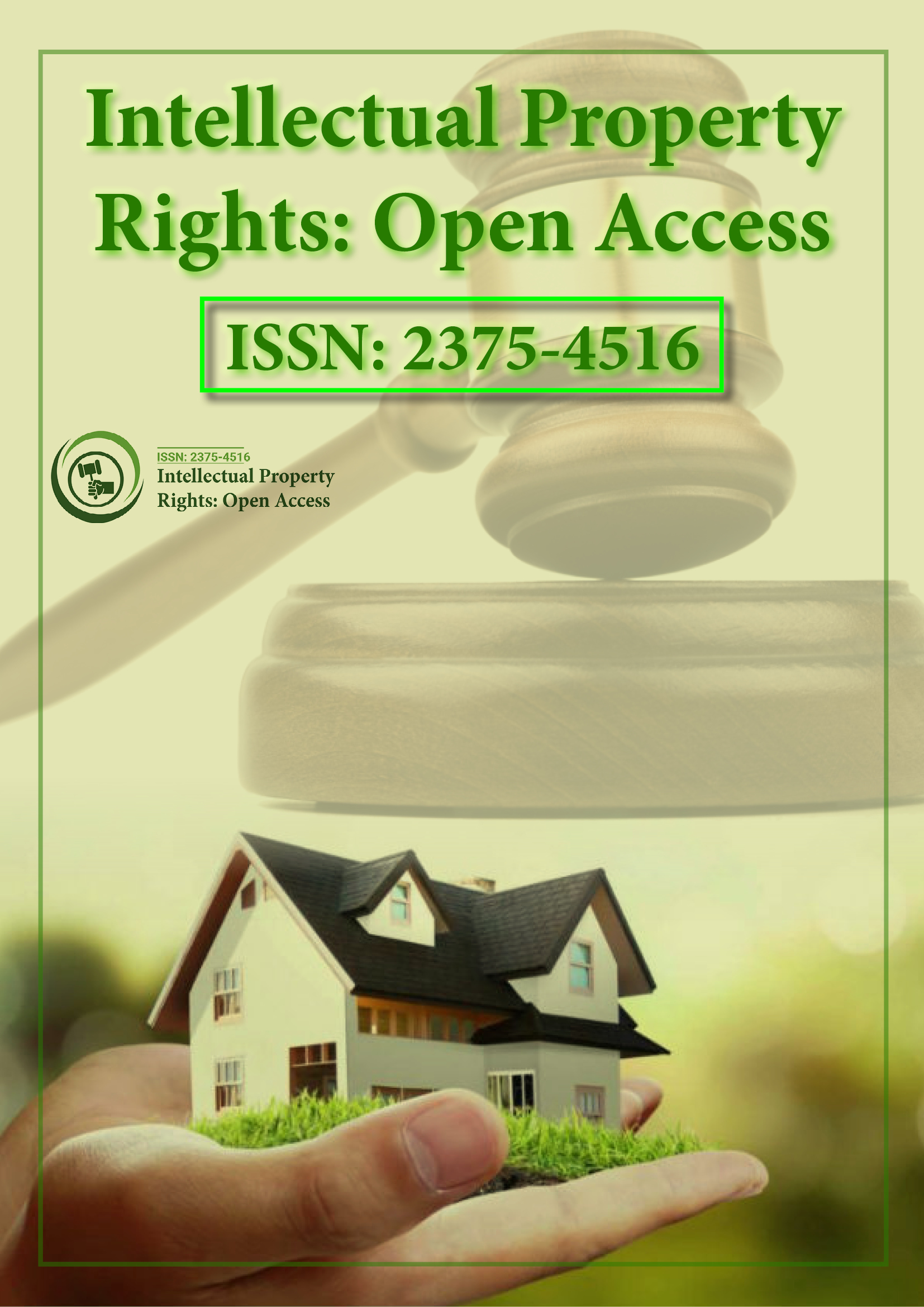Indexed In
- Open J Gate
- RefSeek
- Hamdard University
- EBSCO A-Z
- OCLC- WorldCat
- SWB online catalog
- Publons
Useful Links
Share This Page
Journal Flyer

Open Access Journals
- Agri and Aquaculture
- Biochemistry
- Bioinformatics & Systems Biology
- Business & Management
- Chemistry
- Clinical Sciences
- Engineering
- Food & Nutrition
- General Science
- Genetics & Molecular Biology
- Immunology & Microbiology
- Medical Sciences
- Neuroscience & Psychology
- Nursing & Health Care
- Pharmaceutical Sciences
Commentary - (2023) Volume 11, Issue 1
Protection of Copyright Laws
Madison Ross*Received: 03-Mar-2023, Manuscript No. IPR-23-20568; Editor assigned: 06-Mar-2023, Pre QC No. IPR-23-20568 (PQ); Reviewed: 22-Mar-2023, QC No. IPR-23-20568; Revised: 29-Mar-2023, Manuscript No. IPR-23-20568 (R); Published: 05-Apr-2023, DOI: 10.35248/2375-4516.23.11.221
Description
A group of exclusive rights that Section 14 of the Act confers to the owner are collectively referred to as "copyright.” These rights may only be exercised by the copyright holder or another person to whom the copyright holder has legitimately granted authorization to do so. These rights cover a variety of activities, including as the capacity to modify, duplicate, publish, translate, and interact with the general public.
Copyright, a type of intellectual property, protects original works of authorship once the author fixes the work in a tangible form of expression. Paintings, pictures, graphics, musical compositions, sound recordings, computer programmes, books, poetry, blog posts, movies, architectural works, plays, and a lot more are all considered works in the context of copyright law.
Everyone is the owner of a copyright. Once you make changes to an original work, whether you accomplished it by taking a photo, writing a poem or blog post, or recording a new song, you are the creator and owner of that work.
The copyright of a work may be owned by other people and entities than the author. Ownership is permitted by "works made for hire," which establishes that works created by employees while doing their tasks belong to their employers, in accordance with copyright law. For some independent contractor arrangements and certain categories of commissioned services, the work made for hire doctrine also applies.
In addition to agreements like assignments and other kinds of transfers like wills and bequests, copyright ownership can also result through contracts.
The copyright law defends ideas representations rather than ideas themselves. Under Section 13 of the Copyright Act of 1957, all creative works, including books, plays, music, and films on film and sound recordings, are protected by copyright. The Act, for instance, protects literary creations like books and computer programmes.
The rights to information and compensation for content use are protected by copyright laws for content authors, publishers, producers, and distributors. To deal with digital copyright, new laws have been devised. Information about copyright limits can be found in the 1998 U.S. Digital Millenium Copyright Act (DMCA), copyright laws of the U.S. and other nations, and international copyright treaties.
Digital rights management or copyright management technologies are information systems that regulate and facilitate user access to copyrighted material, track consumption, and give payment and licensing authority. These programmes are frequently incorporated into the websites of publishers or sources.
The laws governing copyright do not apply to discoveries, ideas, concepts, or hypotheses. Slogans, brand names, domain names, and titles are not protected by copyright laws. An original work must be in physical form in order to be protected by copyright. This means that in order for any speech, discovery, musical composition, or idea to be protected by copyright, it must be physically recorded.
Any original literary, artistic, musical, or dramatic works as well as cinematic and sound recording works are protected by copyright laws. Original simply means that the work has not been copied from another source. Copyright safeguards are in place as soon as a work is created, and registration is not necessary. Though registration is generally advised for better protection. Copyright registration just serves as prima facie evidence of an entry regarding the work in the Copyright Register kept by the Registrar of Copyrights; it does not grant any rights.
Citation: Ross M (2023) Protection of Copyright Laws. Intel Prop Rights. 11:221.
Copyright: © 2023 Ross M. This is an open access article distributed under the terms of the Creative Commons Attribution License, which permits unrestricted use, distribution, and reproduction in any medium, provided the original author and source are credited.
